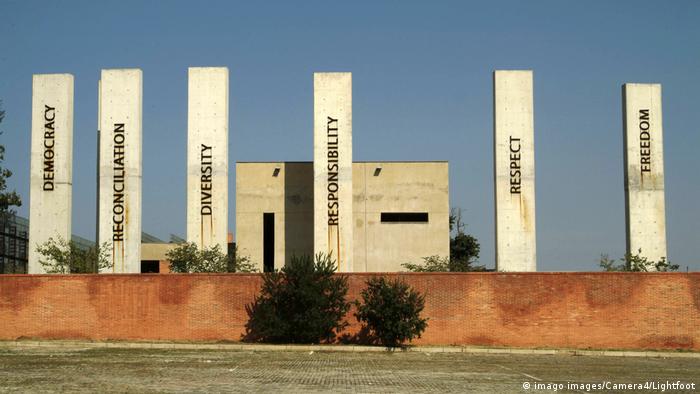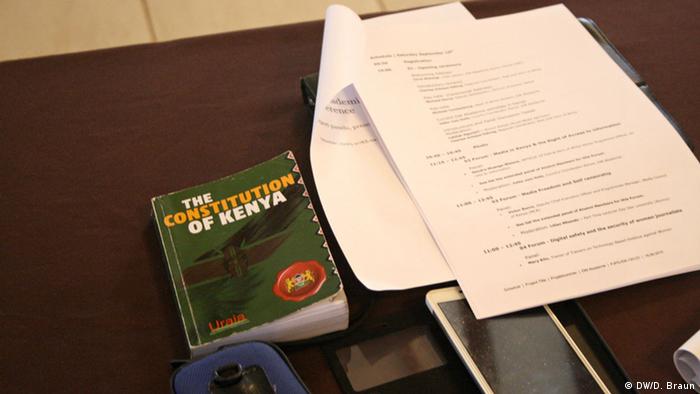Seventy years ago, on 23. In may 1949, it was proclaimed the basic law – it was a Symbol of the new beginning. Half a century later, German constitutional law of South Africa Constitution brought with on the way.

The Dignity of man is inviolable: in the first article of the basic law, one of the core thoughts of the German Constitution. Human dignity, individual freedom and legal equality, but also the decentralisation of state power are the values given to the basic law in Germany to have a strong legitimacy, says the constitutional expert and former CDU member of Parliament Ulrich Karpen. “All values, which are found on the African continent, high in price”. The legal system of the Federal Republic of Germany applies internationally as a highly successful and have inspired various African constitutions.
Constitution of South Africa: from the German basic law, and inspired
Ulrich Karpen was one of three German constitutional law experts consulted after the end of Apartheid, the South African constitutional Assembly. “Starting in 1994, we had to do both with the ANC of Nelson Mandela, and the Inkatha party and the Democratic Alliance.” The German advisers sought to give the South Africans in a party Council, but a non-partisan understanding of the constitutional ideas in the African countries involved.
After the end of apartheid, the democratic South Africa worked between 1994 and 1996, initially for a transitional Constitution, which ensure equal rights for all citizens, and the so-called Homelands of Apartheid prescribed areas of settlement for different ethnic groups – should be re-incorporated into the new South African state. The final Constitution of South Africa came to power in February 1997.
Germany advised the judges of the constitutional court of South Africa
The South African James Fowkes, Professor of International law at the University of Münster, reminds in a DW Interview that one of the first meetings of the new South African constitutional court was held after the Apartheid Era, at the invitation of the Federal government in Karlsruhe, the seat of the Federal constitutional court: “The interests of Germany, to support South Africa in the drafting of its new Constitution, was exceedingly great. The law formulation to have taken the South Africans, largely in their own hands, but many of the ideas are quite Meet in the course of informal with German experts in the Constitution included,” says Fowkes.

The constitutional court in Johannesburg stands for the new South Africa. But first, we met in Karlsruhe, Germany
One of the judges of the constitutional court of South Africa, took on the study tour to the Karlsruhe part, the now-retired Johann Kriegler. “Even before our new constitutional court met for the first time in South Africa, we were invited constitutional court judges for 10 days at the seat of the German Federal constitutional court. A very valuable experience, we learned a lot from our German colleagues,” recalls the 86-Year-old in the DW-interview. He had found some of the Parallels between West Germany after the war and his own country South Africa to Overcome Apartheid, so Kriegler further: “Both countries wanted to contribute with their respective constitutions, especially the construction of rule of law democracies. The constitutional rule of law should never be overridden.”
“Germany’s Constitution stands for a new beginning”
In South Africa we have recognized from afar that the successful departure of the Federal Republic of Germany would not have been possible without the stable Foundation of the basic law is possible, writes the German Professor Ulrich Karpen. “The Africans wanted to complete an epoch: the epoch of colonialism. And you tried to restore order, which had already drawn in the other countries of the world achievements. And in the eyes of those countries that applied for the Federal Republic of Germany.”
In fact, had succeeded in Germany after the Hitler dictatorship, with the basic law, a new Chapter of democracy and the rule of law to turn. “The constitutional Impetus of the ‘never again’ inspired the Constitution to work in South Africa,” confirms James Fowkes of the University of Münster: “Both Germany and the end of the 1940s, as well as South Africa in the mid-1990s understood quite clearly their constitutions as responses to the previous historical misconduct.” The success of this approach have developed a large beam power to other African countries.
The basic law has inspired various African constitutions
In addition to South Africa, the German constitutional lawyer Ulrich Karpen also advised Namibia and, later, Ethiopia. It was known that Germany was also in other countries in Africa such as in Cameroon, Tanzania or Malawi is involved, he stresses. The effects of this cooperation are today found in the constitutions of some African countries.
Parallel to the basic law would between article one, of the basic law (“The Dignity of man is inviolable”) and Chapter three of the Constitution of Malawi, where it is stated that the state had Would “the and the value of every human being to protect”.

Kenya is one of the countries that are inspired with your federalism indirectly, by the basic law
Export Federalism
At the very top of the list of internationally rezipierter ideas of the principle of separation of powers, the guardian role of the Federal constitutional court, as well as the principles of federalism were”,” says constitutional lawyer Karpen: “In South Africa there are provinces, there are countries, and they lead a life of its own within the national framework. This should be reflected in the Constitution, so that countries or provinces room to develop itself. So it is in the Federal Republic of Germany, in the United States of America, and in South Africa.”
Another African country that has expanded its Federal System, most recently, Kenya. With the 2010 Constitution of the country from a centrally governed state had been transformed into a Federal state, says James Fowkes. Here, too, the German basic law seems to have been, even if indirectly, says the South African Constitution: “The German federalism was a key template in the construction of the modern Federal South Africa. The Kenyan Constitution took the and much of the South African Constitution and also by the German basic law.”